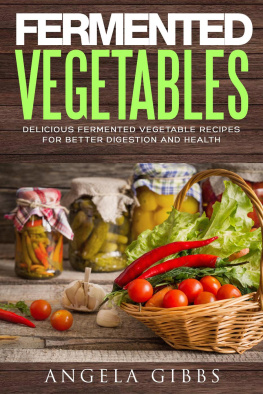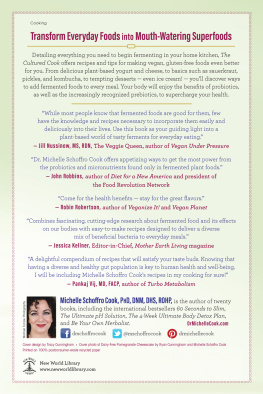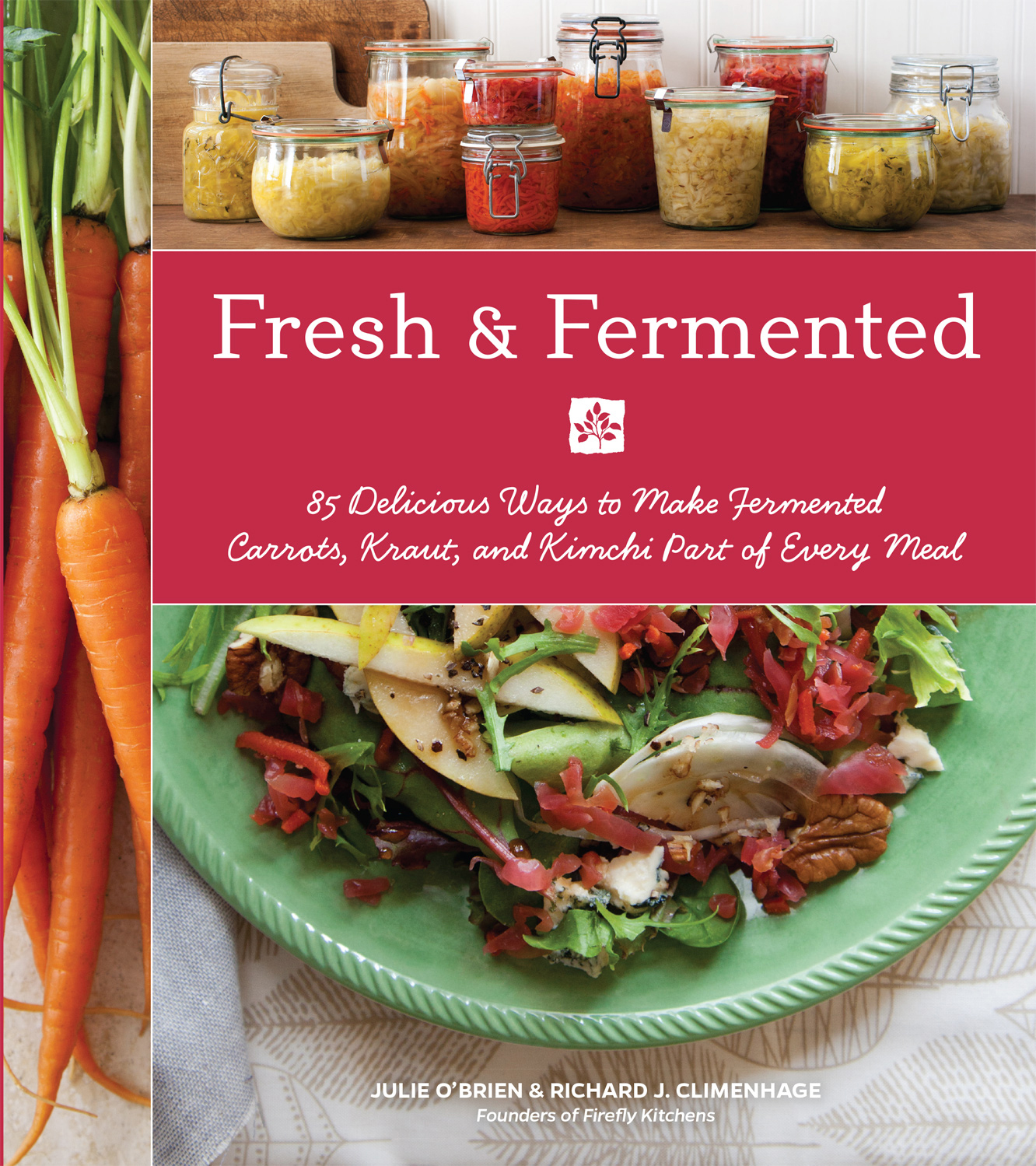Acknowledgments
We are so incredibly thankful to our extended Firefly Kitchens family, our volunteers, and our crew for their endless support, encouragement, and hands-on help for the last five years. We thank you and the many others who have supported us in creating this book.
Big thanks to Gary Luke and Susan Roxborough from Sasquatch Books for providing this opportunity to share our love of ferments with a larger audience, and making this book a reality. Christy Cox and Michelle Hope Anderson and the rest of the Sasquatch team, we are most appreciative of all the technical support on this project. Joyce Hwang, Julie Hopper, and Charity Burggraaf, your design, food styling, and photography are brilliant.
Kim ODonnel and Sally Ekus, thanks for your support and guidance. Ingrid Emerick and Elizabeth Wales, your support and advice about the details of all the unknowns about creating a book were amazing.
Jane Jeszeck and Kitty Harmon, your packaging and presentation of our words, ideas, and recipes into a lovely proposal was what launched this book into being. You have both been so generous and supportive of Firefly since our beginning, and this is proof of that.
Leslie Miller, Kate Rogers, Sandor Katz, Karen Andonian, Adrienne McLaughlin, Rebecca Staffel, and Christi Stapleton, a thousand thanks for your conversations, feedback, and research. Suzanne Cameron, we are forever grateful for all that you do for Firefly Kitchens. Cynthia Lair, thanks for being an inspiration and sharing the love of ferments.
Carol Brown, so many thanks to you for your incredible writing, organizing, and cleaning up of everything we handed over to you. Nora Dummer, thanks for your dedicated time in the kitchen, word wrangling, and your pleasant advice when asked. Sarah Betts, thanks so much for your support from early Firefly days to your thoughtful contribution of ideas, testing, and overall support. Jordan Smith, many thanks for contributing your knowledge and time to our fermentation chapter, recipe testing, and your all-around scientific support of Firefly Kitchens.
The recipe development has been a joy, and wouldnt have been possible without the creative help, counseling, and feedback from so many dear friends. Bebette Cazelais, Betsy Power, Cathy Mowbray, Cathy Sander, Kim ODonnell, Linda Harkness, Linda Stratton, Michelle Fasser, Mary Ingraham, Teri Adolfo, and Theresa Klaassen, a heartfelt thanks. Also to our recipe testers Amanda, Amber, Andrea, Becky, Beth, Deneen, Carolyn, Cicely, Cindy, Christina, Christine, Colin, Debra, Diane, Elyse, Emily, Erin, Heather, Kandi, Kristen, Ian, Jill, Jocelyn, Josh, Julian, Katie, Linda, Nick, Mathew, Maureen, Melanie, Molly, Rachel, Rebecca, Renee, Sheryl, Taryn, Travis, Tyler, and Virginia (and our apologies for those we missed), we thank you for your time and feedback towards this very important part of the process.
To all the co-ops, independents, and the natural food chains, thank you for believing in fermented foods and buying our products. We also want to thank Whole Foods Market and especially Denise Breyley for promoting our foods throughout their stores. We love and appreciate the work done by the Good Food Awards, for helping to educate the public and celebrate all of us who are making these traditional foods in modern times. And to all the people who have shared their stories of health and healing, of fermented family traditions, and the creative ways that you eat these foods daily each and every one of you have contributed in one way or another to Firefly Kitchens and this cookbook.
From Richard:
This has truly been a journey, beginning the day the call came in from Sasquatch Books, through the development of the many unique and wonderful recipes contained on these pages, to the finale when we proudly held the completed book in our hands.
I want to extend heartfelt thanks to my family, my wife, Jo-Ann, and my daughters, Emily and Charlotte. You have all been unwavering supporters by working in the kitchen, enthusiastically sampling our products at stores and events, and are ongoing ambassadors of the foods we create at Firefly Kitchens. I am so grateful for your support and understanding in light of the demands that have come with starting a business and especially during the writing of this book. Thank you for your commitment and love, and for the grace with which you so freely give both.
From Julie:
Mike, Elliott, and Wyatt OBrien, what a gift you are to me! While I know you would rather that I made pies or cookies for a living, you have all been so engaged from the start of Firefly and throughout the creation of this book. You guys are simply the best and I appreciate you so incredibly much. Jessa Garibay, thanks for being that loving and positive daughter I never had. Your help in the kitchen and with all these creations will never be forgotten. Ron, Jean, and Janet Bolton, you are the best family anyone could ever ask for and I am so grateful for all the love and nurturing you continuously share. Your constant enthusiasm and belief in Firefly Kitchens and this cookbook means the world to me.
Linnea OBrien, I love how you have embraced these foods and so willingly share them with others. I appreciate all the testing and collaborating you have done. Diane OBrien, thanks for your loving support and all the diligent testing. Robyn OBrien, please continue, shedding the light on our food system. Your continuous encouragement warms my heart. Julie Hamilton, thanks for being such an inspiration to me, sharing the last thirty-six years of cooking together, and for being a stellar support this last year both in and out of the kitchen. Peggy Lynch, you are an important force in my life. Im so grateful for all the testing, listening, reading, and feedback you have given me over the years and with this book.
And a huge, heartfelt thanks to all the others who supported me along the way.
FROM THE DAWN OF RECORDED HISTORY, humans have been fermenting foodsmeat, milk, wheat, fruits, and vegetables. Many, perhaps all, civilizations have harnessed fermentation to reliably and safely preserve foods. Archaeological evidence suggests that the earliest ferments were alcoholic beverages: Neolithic peoples in China made alcoholic beverages from rice, fruit, and honey, and ceramic vases from around 5000 BC found in modern-day Iran show traces of wine.
A fermented food is one whose taste and texture have been transformed by the introduction of beneficial bacteria or yeast. If youve eaten yogurt, salami, cheese, chocolate, or kimchi, or drunk coffee, wine, whiskey, or beer, youve enjoyed the edible pleasures of fermentation.
Of course, fermented foods taste greatvibrant, with heady aromas, extraordinary flavors, and appealing texturesbut they also play an important role in our bodies. Fermentation partially breaks down food, making the nutrients easier for our bodies to assimilate and the vitamins, enzymes, and minerals more available for us to digest. Fermented foods supply vitamin C and help produce essential vitamins that our bodies cannot make, such as vitamin K and B-complex vitamins. Fermentation also defends our digestive system against harmful bacteria by creating an environment thats too acidic for their survival.
Bacteria in Fermentation
Fermentation is initiated in one of two ways: either by introducing yeast or bacteria into the food to be fermented through a starter culture (such as whey) or naturally, by microorganisms in the environment or already on the food (the Firefly Kitchens approach).







